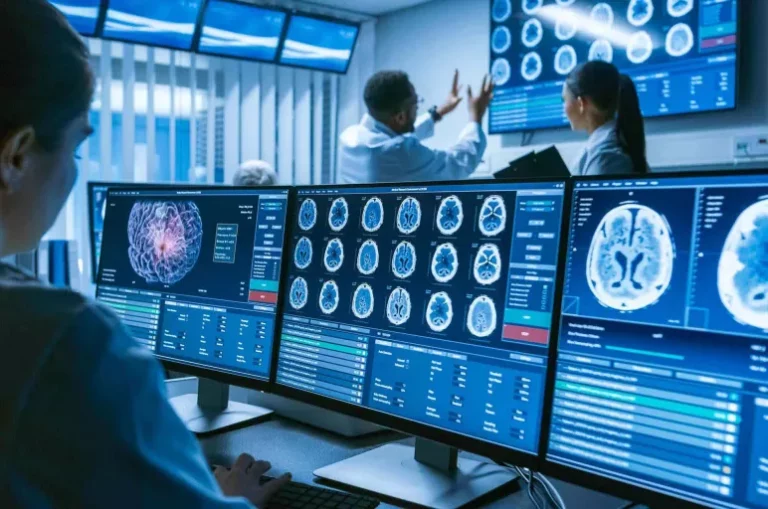Introduction
The medical device industry is on a constant trajectory of innovation, driven by advancements in technology, materials, and personalized medicine. Quality Assurance (QA) professionals play a pivotal role in ensuring the safety and efficacy of these ever-evolving devices, but the landscape is shifting. To stay ahead of the curve, let’s explore some key trends shaping the future of medical device QA:

Use of AI and machine learning in the medical device industry:
The incorporation of AI and machine learning into medical device quality assurance refers to the integration of these technologies into processes to ensure the safety, efficacy and regulatory compliance of medical devices. This includes the use of AI and ML algorithms to automate tasks, improve decision making and ultimately increase the quality and efficiency of medical device quality assurance.
Predictive Maintenance
No longer waiting for devices to fail, AI algorithms can analyze sensor data, usage patterns, and environmental factors to predict potential issues before they occur. This allows for targeted preventative maintenance, minimizing downtime, reducing repair costs, and ultimately improving patient safety. Imagine a cardiac implant continuously transmitting data that AI analyzes to predict a potential battery issue, prompting a timely replacement before malfunction occurs.
Automated Testing
Repetitive and time-consuming testing tasks like stress testing, compatibility checks, and functionality assessments can be automated using AI-powered tools. This frees up valuable time for QA professionals to focus on complex, nuanced testing scenarios and risk analysis, ultimately improving the efficiency and effectiveness of the QA process. Imagine a software-driven tool automatically running thousands of compatibility tests on a new medical device software update, ensuring seamless integration with existing systems.
Risk Management
AI can help! By analyzing vast amounts of historical data, device performance reports, and industry trends, AI can identify and prioritize potential risks associated with medical devices. This enables proactive risk mitigation strategies, allowing manufacturers to address potential issues early on and prevent them from materializing into real-world safety hazards. Imagine AI analyzing millions of patient reports to identify a rare but potentially serious side effect associated with a new medication delivery device, prompting immediate investigation and corrective action.
Utilisation of Big Data and Analytics in the medical device industry:
Real-World Performance Monitoring:
Imagine a scenario where a revolutionary new insulin pump hits the market. Everything seems perfect during clinical trials, but once in the hands of thousands of patients, subtle issues emerge. Real-world data, collected through continuous glucose monitoring and user feedback, reveals unexpected battery drain in specific usage patterns. Analyzing this vast data allows manufacturers to identify and address the issue, improving the device’s performance and ensuring patient safety.
Source: https://www.ncbi.nlm.nih.gov/pmc/articles/PMC6205387/
- Remote Monitoring and Diagnostics: Imagine a future where implanted cardiac defibrillators continuously transmit data to doctors, enabling remote monitoring of a patient’s heart rhythm 24/7. Anomalies detected by AI algorithms trigger timely interventions, potentially preventing life-threatening arrhythmias. This continuous data collection and remote monitoring empowers proactive healthcare, improving patient outcomes and reducing hospital readmissions.

Integrating Cybersecurity:
- Addressing Cybersecurity Threats: Visualize a scenario where hackers exploit vulnerabilities in a connected insulin pump, manipulating insulin delivery and putting patients at risk. Robust cybersecurity measures, encompassing secure communication protocols, encryption at rest and in transit, and regular penetration testing, are no longer optional but essential. Protecting patient privacy and device integrity in an increasingly connected world requires a proactive and multi-layered approach to cybersecurity.
- Secure Software Development Practices: Building a secure device is like building a fortress; weaknesses in any brick can compromise its integrity. Implementing secure coding practices from the outset, including input validation, buffer overflow prevention, and regular vulnerability assessments throughout the development lifecycle, is crucial. This ensures a robust foundation that minimizes security risks and safeguards a patient’s well-being.

Enhancing User Experience (UX) and Usability:
- Virtual and Augmented Reality (VR/AR) Training: Imagine new surgeons practicing complex procedures on virtual patients in a VR operating room, gaining invaluable experience and confidence before operating on real patients. VR/AR simulations not only improve device familiarity but also foster better decision-making under pressure, ultimately reducing errors and improving patient outcomes.
- Human Factors Engineering: Visualize a medical device interface so intuitive that even a sleep-deprived nurse can operate it flawlessly. Human factors engineering goes beyond functionality, considering user needs, cognitive limitations, and environmental factors to create devices that are safe, easy to use, and minimize the risk of human error. By prioritizing user-centered design, we can ensure that medical devices are not just effective but also truly user-friendly tools for improved patient care.
Regulatory Evolution:
- Harmonization of Regulations: Imagine navigating a complex maze of different regulations for each country you want to sell your medical device in. The future holds hope for a more streamlined approach! Efforts are underway to harmonize global medical device regulations, like the initiatives by the International Medical Device Regulators Forum (IMDRF). This collaboration aims to establish common standards and requirements, simplifying compliance processes for manufacturers and ultimately accelerating innovation and access to life-saving technologies for patients worldwide.
- Focus on Patient-Centricity: Patients are no longer passive recipients of healthcare; they are increasingly involved in shaping their treatment options. This shift is reflected in evolving regulations that emphasize patient safety and active participation in the development process. Imagine patients providing feedback on early prototypes of medical devices, ensuring they address real needs and offer user-friendly interfaces. This patient-centric approach prioritizes safety, efficacy, and usability, leading to devices that truly serve the needs of those who rely on them.

By embracing these trends and continuously adapting, QA professionals can ensure that medical devices remain safe, effective, and user-friendly in the ever-evolving healthcare landscape. Remember, the future of medical device QA is about leveraging technology, data, and collaboration to prioritize patient wellbeing and advance healthcare innovation.
Zamann: Your Trusted AI Partner
- In the ever-evolving landscape of medical technology, ensuring the quality and safety of medical devices is paramount. That’s where Zamann Pharma steps in, championing cutting-edge advancements in medical device QA to safeguard patient well-being.
- As the future of medical devices unfolds, innovative technologies like AI and automation are transforming QA processes. Zamann Pharma Support stays ahead of the curve, actively integrating these advancements to guarantee the highest standards of quality for their devices.
- By embracing innovation, Zamann Pharma demonstrates their unwavering commitment to excellence in medical device QA. Explore their dedication to patient safety and discover how their commitment translates into reliable, life-saving technologies.
AI revolutionizing your business? Get ahead of the curve, looking for expert support?
Additional Resources:
- Medical Device and Diagnostic Industry (MDDI): https://www.mddionline.com/
- ECRI Institute: https://www.ecri.org/
- Regulatory Affairs Professionals Society | RAPS
- Medical Device Testing – Tentamus Group
- Home – MedTech Intelligence
- Digitalization, Validation, and Qualification Experts | Zamann Pharma Support (zamann-pharma.com)
At Zamann Pharma, we understand the challenges and opportunities this transition presents. Our sophisticated solutions and expert services are designed to empower medical device companies to navigate this complex landscape with confidence.

Susmitha Konakanchi
Quality Specialist
